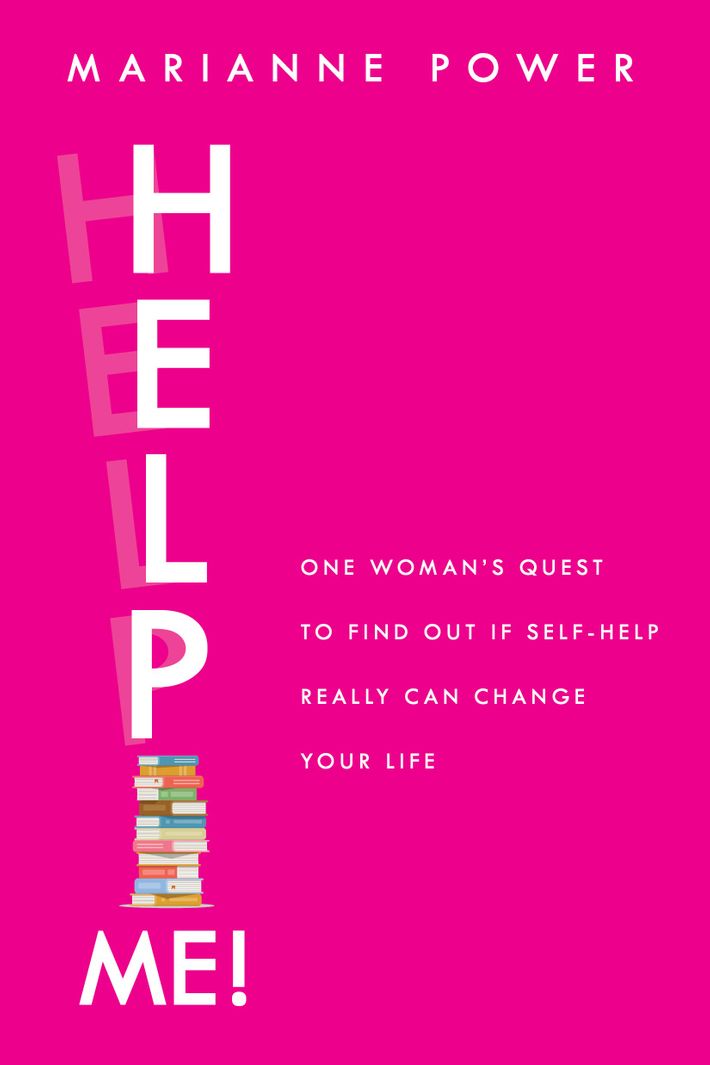
The day after New YearÔÇÖs is dull and gray, and the whole of London looks like a late-stage hangover, muttering desperately about Dry January and other impossible resolutions. ItÔÇÖs a good day to meet with Marianne Power ÔÇö a day very much like the morning almost exactly five years ago when she found herself poised above the murky, freezing water of the outdoor pond on Hampstead Heath, ready to take a swim.
She had decided that day to make herself over, and ÔÇö this being 2014 ÔÇö to blog about it. Her plan was simple. Every month she would choose a different self-help book and follow it devotedly. She would feel the fear and do it anyway, unleash the power within, dare greatly, and (if all went to plan) heal her life. Instead, amid a spiral of self-obsession and self-doubt, her life threatened to fall completely apart. Her book, Help Me! ÔÇö out this week from Grove Press ÔÇö chronicles her bumpy road from a ÔÇ£life-changing hangoverÔÇØ to a more humble kind of self-awareness, via flirtations with celestial guardian angels and bearded men in coffee shops, expensive retreats and lots of cheap wine. Discussing the experience over tea and cake in a north London caf├®, Power is earnest and emotional; one of the consequences of trying to improve yourself all the way to a breakdown, she admits, is that the smallest things make you cry.
Before embarking on her self-improvement quest, Power treated self-help books like comfort food. The fantasy they offered ÔÇö of getting richer and skinnier and finding love ÔÇö was enough on its own, akin to buying glossy cookbooks ÔÇ£and eating chips every night.ÔÇØ When it came to their potential effectiveness, she was as skeptical as any Londoner. But as she got deeper into her 30s, discontentedly single, in debt, and surrounded by friends who seemed more successful, Power began to feel ÔÇ£defective.ÔÇØ What would happen if she embarked on a measurable, concrete mission: To perfect not one small area of her life but all of it, forever?
Most of PowerÔÇÖs chosen titles promise big, sweeping change. Her year began with Susan JeffersÔÇÖs 1987 classic Feel the Fear and Do It Anyway ÔÇö which in her case meant skydiving, nude modeling, and, scariest of all, talking to strangers. She walked through hot coals at a Tony Robbins retreat and wrote herself huge checks in the hope that the money would manifest for real, through the power of ÔÇ£the Secret.ÔÇØ She tried communicating with angels and saying ÔÇ£f**k itÔÇØ to all her anxieties. Hers were the kind of self-help books that promise to explain everything, manifesting millions of fierce devotees from whom you would probably back away at a party.
But few people backed away from Power ÔÇö not even Brits, who wear their cynicism like a badge of courage. Instead, ÔÇ£I got emails from really quite senior, successful people saying, ÔÇÿI relate to this so much,ÔÇÖ or ÔÇÿI struggle with this.ÔÇÖÔÇØ And the genre wasnÔÇÖt played out; it was bigger than ever. Visiting a central London bookstore recently, Power found a self-help section that could have swallowed another store ÔÇö subdivided into sections like ÔÇ£spiritualityÔÇØ (sub-subsection: angels), and something called ÔÇ£smart thinking,ÔÇØ covering everything from Steven Pinker to ÔÇ£entrepreneurial success literatureÔÇØ (self-help that men wonÔÇÖt be embarrassed to buy). The new vogue for ÔÇ£wellnessÔÇØ and ÔÇ£mindfulnessÔÇØ allows practitioners to talk about self-improvement without the lingering stigma of the term ÔÇ£self-help.ÔÇØ And among ÔÇ£younger, cooler people,ÔÇØ formerly fringe elements like crystal healing are moving to the mainstream. ÔÇ£All the witchy-type things are very popular at the moment, especially with young women,ÔÇØ Power notes. ÔÇ£And shamanism. Around Hackney you canÔÇÖt go to the supermarket without hearing someone on the phone talking about their ayahuasca experience.ÔÇØ
PowerÔÇÖs mission, then, was to stay afloat in the sea of hype and find her own way forward. And her solution, ultimately, was old-fashioned therapy. In the U.K., thatÔÇÖs a bigger leap than you might imagine. ÔÇ£IÔÇÖd thought you either had to have real, serious problems or you were a self-indulgent nightmare if you went to therapy,ÔÇØ Power says. ÔÇ£There is still this British and Irish thing of keeping your feelings down, stiff upper lip. Or drinking our feelings away.ÔÇØ┬á
It was PowerÔÇÖs therapist who helped her understand why her self-directed project fell apart, why itÔÇÖs impossible ÔÇ£to fix yourself with the same brain that caused your problems.ÔÇØ Although she couldnÔÇÖt help raising an eyebrow in her book ÔÇö a therapist would say that, wouldnÔÇÖt she? ÔÇö Power eventually realized that she needed a check on the all-absorbing focus on herself. ÔÇ£I thought the more I thought about myself, the more I would get answers,ÔÇØ she says. ÔÇ£But it didnÔÇÖt happen like that. The more I was thinking about myself, the more problems I could see, and the more self-involved and cut off from people I was becoming.ÔÇØ Her friends and family, initially supportive but skeptical, couldnÔÇÖt understand why someone they loved needed to work so hard to fix flaws in herself that only she could see.
Then there was the problem of connecting to others on the most intimate levels. Although finding a partner is one of the perennial goals of self-help, Power took her time before getting to a dating guide ÔÇö Matthew HusseyÔÇÖs Get the Guy, which posits that meeting a potential partner is basically a numbers game. She dutifully began approaching strangers and arranging excruciating Tinder dates, but hers was not a romantic odyssey. After meeting a handsome stranger in a coffee shop, she got invited to a wedding on a Greek island, but decided she was too broke and depressed to go. Today, she talks passionately about the perception that being single represents a flaw or affliction. She now believes it isnÔÇÖt a question of confidence or initiative, or something to ÔÇ£fixÔÇØ with a five-point action plan. It goes much deeper than that. Feeling yourself to be worthy of love is the project of a lifetime, not just a year.
Given everything sheÔÇÖs learned, I ask Power if she considers her own memoir, in its way, a self-help book? She didnÔÇÖt intend it that way, but is now hearing from readers in other countries where the bookÔÇÖs been published ÔÇö in Portugal, in Korea ÔÇö who have identified with her story. One woman said it was like reading about herself, ÔÇ£and she figured she wasnÔÇÖt so bad after all, because she liked me in the book.ÔÇØ Power believes (and others agree) that humbler, more personal stories like hers, which admit to struggle and doubt, are becoming more popular than books full of programmatic promises.
Anyone can be a source of help, after all ÔÇö memoirists, philosophers, village elders, priests, family members. Power remains a big fan of Bren├® Brown, the author of Daring Greatly, who says she doesnÔÇÖt believe in the term self-help, ÔÇ£because she doesnÔÇÖt think weÔÇÖre meant to do it on our own. WeÔÇÖre meant to help each other.ÔÇØ The books sheÔÇÖs looking for now are more generally geared toward understanding life. ÔÇ£I do find being a human being a hard process and IÔÇÖm always trying to understand it a bit more.ÔÇØ
While Power recognizes the value of self-help books, sheÔÇÖs grown wary of their suggestion that perfection is possible. Not every day can be evidence of your best life ÔÇö even if social media, especially Instagram, demands that we constantly perform our best lives for an audience, implying that ÔÇ£if life isnÔÇÖt a yoga pose on a sunset beach then youÔÇÖre a bit of a dud.ÔÇØ It took more than a year of ÔÇ£bashing my head against the wall trying to be perfect,ÔÇØ says Power, to understand that thereÔÇÖs really no such thing.
So perfection may not be possible in life, but is there a perfect self-help book? When I ask which one sheÔÇÖd save from a burning house, sheÔÇÖs diplomatic: ÔÇ£I think thereÔÇÖs wisdom in loads of them.ÔÇØ But Eckhart TolleÔÇÖs The Power of Now has pride of place at her bedside. ÔÇ£ItÔÇÖs about this annoying, obvious thing of just being in the moment, instead of worrying about whatÔÇÖs going to happen tomorrow or criticizing ourselves for whatÔÇÖs happened in the past.ÔÇØ Accordingly, thereÔÇÖs no grand revelation at the end of PowerÔÇÖs book, but a series of kind and ordinary truths: Be honest. Be kind. Lighten up. Have a drink. YouÔÇÖre doing great. ÔÇ£Such boring wisdom at the end, isnÔÇÖt it?ÔÇØ


